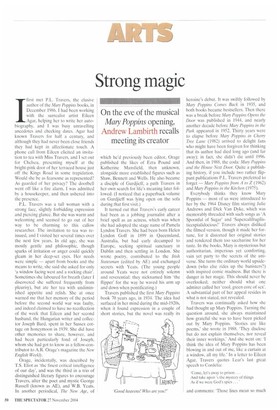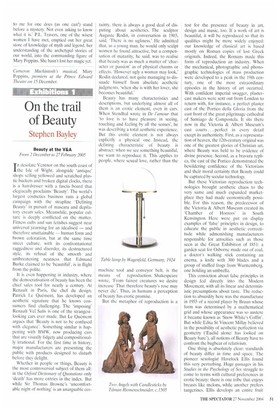Strong magic
On the eve of the musical Mary Poppins opening, Andrew Lambirth recalls meeting its creator 1 first met Pl. Travers, the elusive author of the Mary Poppins books, in December 1986. I had been working with the surrealist artist Eileen Agar, helping her to write her autobiography, and I was busy unravelling anecdotes and checking dates. Agar had known Travers for half a century, and although they had never been close friends they had kept in affectionate touch. A phone call from Eileen elicited an invitation to tea with Miss Travers, and I set out for Chelsea, presenting myself at the bright-pink door of her terraced house just off the Kings Road in some trepidation. Would she be as fearsome as represented? As guarded of her privacy? The doorbell went off like a fire alarm, I was admitted by a housekeeper, and then ushered into the presence.
P.L. Travers was a tall woman with a strong face, slightly forbidding expression and piercing glance. But she was warm and welcoming and seemed to go out of her way to be charming to this callow researcher. The invitation to tea was reissued, and I visited her several times over the next few years. In old age, she was mostly gentle and philosophic, though sparks of irritation or anger could quickly gleam in her deep-set eyes. Her needs were simple — apart from books and the means to write, she said she asked for only 'a window facing west and a rocking chair'. Sometimes she laboured for breath (later I discovered she suffered frequently from pleurisy), but ate her tea with undiminished appetite and relish. She at once warned me that her memory of the period before the second world war was faulty, and indeed claimed to have no recollection of the week that Eileen and her second husband, the Hungarian writer and collector Joseph Bard, spent in her Sussex cottage on honeymoon in 1939. She did have other memories to share, however, and had been particularly fond of Joseph, whom she had got to know as a fellow-contributor to A.R. Orage's magazine the New English Weekly.
Orage, incidentally, was described by T.S. Eliot as 'the finest critical intelligence of our day', and was the third in a trio of distinguished literary figures to encourage Travers, after the poet and mystic George Russell (known as AE), and W.B. Yeats. In another periodical, The New Age, of which he'd previously been editor, Orage published the likes of Ezra Pound and Katherine Mansfield, then unknown, alongside more established figures such as Shaw, Bennett and Wells. He also became a disciple of Gurdjieff, a path Travers in her own search for life's meaning later followed. (I noticed that a paperback volume on Gurdjieff was lying open on the sofa during that first visit.)
It turned out that Travers's early career had been as a jobbing journalist after a brief spell as an actress, which was when she had adopted the stage name of Pamela Lyndon Travers. She had been born Helen Lyndon Goff in 1899 in Queensland, Australia, but had early decamped to Europe, seeking spiritual sanctuary in Dublin and then settling in London. She wrote poetry, contributed to the Irish Statesman (edited by AE) and exchanged secrets with Yeats. (The young people around Yeats were not entirely solemn and reverential: they nicknamed him 'the flipper' for the way he waved his arm up and down when pontificating.)
Travers published the first Mary Poppins book 70 years ago, in 1934. The idea had surfaced in her mind during the mid-1920s, when it found expression in a couple of short stories, but the novel was really its heroine's debut. It was swiftly followed by Mary Poppins Comes Back in 1935, and both books became bestsellers. Then there was a break before Mary Poppins Opens the Door was published in 1944, and nearly another decade before Mary Poppins in the Park appeared in 1952. Thirty years were to elapse before Mary Poppins in Cherry Tree Lane (1,982) arrived to delight fans who might have been forgiven for thinking that its author had died long ago (and far away); in fact, she didn't die until 1996. And then, in 1988, the coda: Mary Poppins and the House Next Door. Quite a publishing history, if you include two rather flippant publications P.L. Travers preferred to forget — Mary Poppins from A to Z (1962) and Mary Poppins in the Kitchen (1975).
Everybody thinks they know Mary Poppins — most of us were introduced to her by the 1964 Disney film starring Julie Andrews and Dick Van Dyke, which was memorably threaded with such songs as 'A Spoonful of Sugar' and Supercalifragilisticexpialidociousr Travers always disliked the filmed version, though it made her fortune, for it distorted her original stories and rendered them too saccharine for her taste. In the books. Mary is mysterious but authoritarian, imperious yet comforting, vain yet party to the secrets of the universe. She turns the ordinary world upsidedown (who else rides up the banisters?) with inspired comic madness. But there is danger in her magic. This should never be overlooked; neither should what one admirer called her 'cool, green core of sex'. A substantial part of her appeal resides in what is not stated, not revealed.
Travers was continually asked how she had thought up Mary Poppins. Turning the question around, she always maintained how grateful she was to have been picked out by Maly Poppins. 'Stories are like poems,' she wrote in 1988. 'They disclose but do not explain themselves, nor reveal their inner workings.' And she went on: 'I think the idea of Mary Poppins has been blowing in and out of me, like a curtain at a window, all my life.' In a letter to Eileen Agar, Travers quotes Lear's last great speech to Cordelia:
'Come, let's away to prison.
And take upon 's the mystery of things As if we were God's spies...'
and comments: 'Those lines mean so much
to me for one does (as one can!) stand before a mystery. Not even asking to know what it is.' P.L. Travers, one of the wisest women I have met, emptied out her great store of knowledge of myth and legend, her understanding of the archetypal stories of our world, into the commanding figure of Mary Poppins. She hasn't lost her magic yet.
Cameron Mackintosh's musical, Mary Poppins, premiers at the Prince Edward Theatre on 15 December.



















































































 Previous page
Previous page